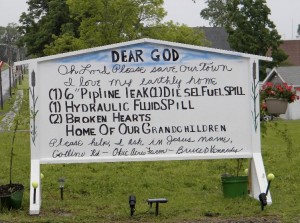Multiple Wastewater Violations
From the Article by Gayathri Vaidyanathan, E&E reporter, EnergyWire: Tuesday, March 26, 2013
Some oil and gas operators in West Virginia spilled wastewater into the environment even after getting multiple citations from the WV Department of Environmental Protection. Between 2011 and 2012, companies including Raven Ridge Energy LLC, Chesapeake Appalachia LLC, and EQT Corp. were cited for repeated violations including working without a permit, spilling wastes into state waters, and failing to properly construct roads and pads.
Inspection reports from the WV-DEP’s Office of Oil and Gas (OOG) show repeated violations by operators, sometimes on the same well pad within a span of months. The OOG, working within the narrow confines of its power granted by the state Legislature, initially issues violation notices to a company. If the problems on a work site are not fixed, the OOG can issue a stop work notice, assess a fine, or file a misdemeanor charge or injunctive relief. The office cannot withdraw a permit already granted, but it can suspend it and block future permits.
In April 2011, Raven Ridge Energy was cited for constructing a well pad without first informing the OOG. Then in May, the company was cited for building an illegal road up to the well pad. The construction led to sediment fouling the creek.”Start adhering to permit as approved, quit taking short cuts,” inspector Terry Urban wrote in the violation notice. The company later fixed the violations.
Because Raven cleaned up after each violation was found, it did not get a stop work order. But the company continued violating environmental regulations on other well pads. In December 2011, it was cited for not having a sediment control plan in place on a well pad. The same month, it was cited for starting work at another location without a permit. In February and June 2012, the company was cited for polluting waters of the state. In December 2012, it was cited for beginning work without a permit and for failing to prevent sediment from contaminating surface waters.
The WV-DEP said it has stepped up its enforcement, adding eight inspectors to its rolls. The state has updated its law to deal with horizontal drilling, and the DEP currently has 40 pages of new rules for approval in the Legislature, according to Kathy Cosco, communications director.
Help for surface owners?
The politics between drillers and WV-DEP enforcement has left landowners sometimes feeling shorthanded in taking on the industry. Landowners say it can be difficult to get action from the DEP on spills on their property, and they are not always informed of a violation that could affect their water resources.
When the OOG issues violation notices for water contamination, it sometimes asks the company to test soil for toxic chemicals. In one case in Harrison County, that testing was the beginning and end of the enforcement, said Marc Glass, an environmental scientist at Downstream Strategies. When Glass arrived at the client’s property in September 2011, he saw a pit in the ground holding flowback and produced water. The 40-millimeter plastic sheet lining the pit was torn.
The pit was in direct contact with fractured bedrock, a potential conduit between the flowback and groundwater, according to Glass. When he tested the family’s water well, he found contaminants including hydrocarbons, arsenic, manganese, chlorides and other contaminants of gas drilling. The family’s water supply was tainted.
Water monitoring wells would have allowed the DEP to track the movement of the contaminant plumes in case they posed a risk to groundwater, but they weren’t required in this case. “If it was a gas station that had leaked the same contaminants, there would be several monitoring wells required by law,” Glass said. “But for the oil and gas industry, it is not automatically required by law, it is at the discretion of the Division of Oil and Gas.”
“The Office of Oil and Gas sees it [violations] as a civil issue between surface owner and gas company,” said the landowner, who prefers to remain anonymous because he is negotiating with the gas company. “There is no state agency that helps the surface owner.”
In another case, Casey Griffith, a landowner in Marion County, recalled that a driller on his property had allowed an impoundment in front of his house to drain into a creek. Griffith called the WV-DEP and provided the agency with photos of the violation. The agency did not write up the violation, he said. In another incident, the company had built the well pad without soil and erosion control, allowing sediment to flow off the well site, across the country road and into his yard.


{ 1 trackback }